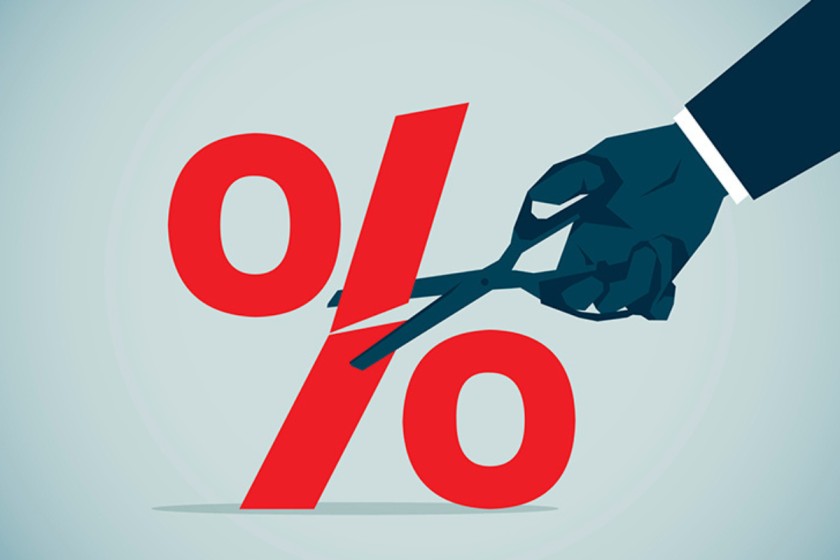- April 18, 2024
Reflation Desperation: Rate cut hopes dashed

Welcome to what Goldman Sachs is calling “reflation desperation”. For policymakers and investors, this will be a nauseating and probably lengthy ride.
The embarrassing reset has come about because it turns out the inflation dragon had not been slain after all, despite markets in effect calling victory over it late last year.
One punchy US consumer price index inflation reading may be regarded as a misfortune. Two looks like carelessness. Three in three months, as we have now, are impossible to explain away. The fact that the rises are small and that this is not the Federal Reserve’s preferred measure of inflation is not enough to negate the signal, especially combined with this week’s gangbusters US retail sales data.
The great bet on rate cuts — and it was enormous — is dead. At the start of 2024, the expectation was for six, maybe seven, US rate cuts this year. That felt silly even then, but it is unravelling in humbling fashion. Today markets are pencilling in one, maybe two.
Bank of America has shoved back its call for the first Fed cut from June all the way out to December — a huge jump for a tweak that typically moves in increments of one or two months at a time and that opens up the very real possibility that cuts may not land this year at all. Goldman Sachs, which was once in the “five cuts” camp, has now shifted from three to two, starting in July rather than June. Bond prices have dropped and are dragging stocks down with them.
How did everyone manage to get so carried away with the notion that rates were poised for an aggressive chop? It certainly seems time for some introspection on all sides.
The main reason is that we are trapped in old ways of thinking, convinced inflation will fall back to something that feels like a norm and that central banks will hurry to retreat to the warm waters of the low interest rates that dominated the post-crisis era until after war and pestilence arrived. The reality is clearly more complicated than that.
For a while, there was a clear dividing line: markets repeatedly leapt on signs of potential cuts, and central bankers doused them again, reminding investors of their sacred duty to keep inflation in check. It felt as if markets were from Mars and policymakers were from Venus, looking at the same facts and drawing starkly different conclusions.
For Jean Boivin, formerly deputy governor at the Bank of Canada and now global head of research at the BlackRock Investment Institute, extra complications set in at the Fed’s rate-setting meeting in December. Then, the central bank kept rates on hold, but also provided no pushback to growing market expectations that they would start to fall quickly, and indeed provided guidance that it would cut three times in 2024.
“Central bankers have been behaving more like traders of late,” said Boivin. “They were aware of the uncertainty, but they said they were going to take a bet. They went all-in on immaculate disinflation. That Mars and Venus thing flipped. Or maybe they are both on Venus.”
To be fair to bond investors, few sincerely believed in seven cuts, but probably three or four, with some hedges against a truly dire recession layered on top. And in fairness to central bankers, steering monetary policy through a storm of shocks including frozen supply chains and war on European soil is no simple task.
The soul searching has begun. The Bank of England, for instance, has just wrapped up a review led by former Fed chair Ben Bernanke, who concluded that UK policymakers had demonstrated “significant shortcomings” stemming from faulty thinking, antiquated software and a struggle to communicate clearly. The Fed has now also acknowledged it is taking “longer than expected” to tame inflation.
This is a rich elixir for political blowhards who wish to pin blame for the rise in inflation and decline in living standards on independent monetary policymakers, and for investors keen to find someone to blame for their market mis-steps.
The reality is that this is what data dependency — the policymakers’ mantra — really looks like. Rate setters are less able to spoon-feed investors granular guidance on what will happen next, because they are as easily pushed around by economic data as the rest of us. They may never again achieve their mission to be boring in our lifetimes. As long as deglobalisation, the green transition and heavier fiscal spending on the likes of defence persist, inflation will swing around and provoke abrupt changes of heart. We all have to learn to live with flip-flopping narratives and markets.
© The Financial Times Limited [2020]. All Rights Reserved.
FT and Financial Times are trademarks of the Financial Times Ltd. Not to be redistributed, copied or modified in any way.
